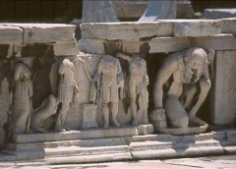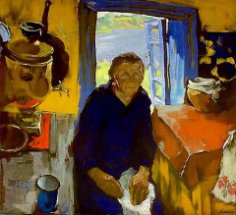
When you look at the historical map of the ancient world and compare the enormous size of the Persian Empire with the small territory of Greece, it seems incredible that in the struggle between these two countries, which lasted throughout the first half of the 5th century BC, Greece emerged victorious.
The Athenian state played the main role in the victory of the Greeks over the Persians. The Athenians, having created a strong fleet of three-deck ships with rams on the bow, dealt the enemy a number of crushing blows at sea. And on land, the Greek phalanxes, acting in a closed formation of well-trained warriors, won victories over numerous enemies. The bulk of the Persian army consisted of warriors from enslaved tribes and peoples. Persian commanders used whips to force the warriors to go into battle, and the Greeks heroically defended their native land. The Greek historian Herodotus rightly called the Athenians the saviors of Hellas.
After the victory over the Persians, a brilliant era in the history of Athens begins. Athens becomes a powerful maritime power with highly developed crafts, shipbuilding and trade. Many free and slave prisoners captured during the war worked in workshops, mines, construction, and the navy. After the end of the wars, the source of enrichment of the Athenian treasury became the naval union organized by Athens to fight Persia at sea. The Athenians began to spend the monetary contributions of the allies, intended for the construction of warships, on the needs of their state.
The 5th century BC is called the “golden age” in the history of Athens. During this time, Athens enriched world culture with such values that, according to an Athenian historian, are worthy of being “an object of wonder for contemporaries and descendants.”
This was the time of the flourishing of democracy. All free citizens received the right to participate in the government. The main state institution was the people's assembly, in which all Athenian citizens could participate. The people's assembly was usually convened three times a month, and in exceptional cases even more often.
The people's assembly took place on the slope of the Pnyx hill, and in earlier times on the market square – the agora. Citizens walked to the place of assembly, surrounded by a red rope, and sat on benches. About 5 thousand people were seated on the Pnyx. Here one could see eminent and rich citizens in beautifully draped cloaks – himations, there were many working people who came here, having torn themselves away from their daily work, sometimes not having time to change their clothes. Peasants who came from the countryside were in felt hats, chlamydes and with staffs in their hands.
The People's Assembly elected officials, decided issues of war and peace and treaties with other states, discussed and approved laws and considered other important issues of state life.
To manage the life of the state, starting in 510, a “council of five hundred” was chosen by lot. An epistate was elected every day – a chairman who led the people's assembly, received ambassadors, kept the state seal and the keys to the state treasury. No one could be elected epistate twice.
Every Athenian citizen could propose a new law. But this did not mean that it was easy to implement. The draft law was carefully examined, it was determined whether it contradicted previous laws, whether it was harmful to the republic. If the latter was recognized, the author was fined and could be subject to other punishments. After discussing the bill in the “council of five hundred” and at the people's assembly, a vote took place. And if the bill received a majority of votes in the people's assembly, it became a law.
When discussing matters in which the interests of different groups clashed, popular assemblies were stormy and sometimes could not do without scuffles. This was the case when deciding the issue of the Peloponnesian War. The master gunsmiths and suppliers of military equipment were in favor of the war, expecting large profits from it. The farmers knew that the war would bring them ruin, and they protested ardently against it. “The hoe-maker spat in the gunsmith's face, and the plow-smith punched the spear-maker in the ribs,” – this is how the ancient Greek writer Aristophanes describes the clash that broke out at the popular assembly.
If in Sparta the decision that was made at the popular assembly was the one that was shouted for the loudest, then in Athens issues were decided by voting – by raising hands or dropping pebbles into an urn.
Every year, one of the people's assemblies was devoted to ostracism (ostrakon – a shard for voting, which was dropped into an urn). At this meeting, everyone could write on a shard the name of someone he considered dangerous to the Athenian Republic. The shards were dropped into the urn and counted. The person whose name was repeated on the most shards was considered dangerous and was banished from Athens for 10 years.
In addition to participating in the popular assembly, ordinary people could be elected to various public offices. Pericles, the leader of the Athenian democracy, introduced wages for some public offices so that artisans, small traders, farmers and other poor people, having been elected, could take a break from their work without noticeable damage to themselves. The Athenians did not respect a person who avoided public affairs and considered him empty.
The love for the fatherland was valued most in a person. Giving one's life for it was considered an honor. Young men who reached 18 years of age solemnly took an oath that they would do everything in their power to strengthen their fatherland.
Usually, wealthy Athenian citizens (men) spent a lot of time outside the home: they visited public institutions, did gymnastic exercises (running, throwing discus and javelin, wrestling), talked in the streets, in porticos and shady alleys of public gardens and parks. Everywhere was crowded and interesting: people discussed the news, argued on a variety of issues. Here you could also listen to the “teachers of wisdom”, as philosophers were called. The Athenians valued the art of eloquence and willingly listened to good speakers. The ability to convince listeners contributed to promotion to government posts. Therefore, rich people did not spare money to teach their sons the art of oratory. Pericles was considered an unrivaled orator. His political opponent said that if, fighting Pericles, he put him on both shoulder blades, and Pericles began to prove that he himself had won, then all the listeners would believe Pericles, despite the obviousness of the situation.
The theatre was considered a matter of state importance. It was given great educational significance. The Theatre of Dionysus could accommodate 17 thousand spectators. Theatrical competitions lasted for several days, 4-5 plays were staged daily. During this time, business life in the city died down, public assemblies were not convened, and many state institutions were closed. So that poor citizens could attend the theatre, so-called entertainment money was distributed from state funds in Athens. The costs of staging performances were imposed as a public duty on some rich citizen (choregos). For this, he was awarded a bronze tripod and given all sorts of honours.
In Athens, in addition to theatrical and musical competitions, there were also gymnastic ones. But the cherished dream of every young man was to participate in the pan-Greek Olympic Games.
The beauty of this city inspired the Athenian citizens with a sense of pride in their state. Athens of the 5th century BC was not only the “school of Hellas”, as Pericles called it, but also a school for the entire world of that time. The cultural heritage of the ancient Greeks enriches us too.





